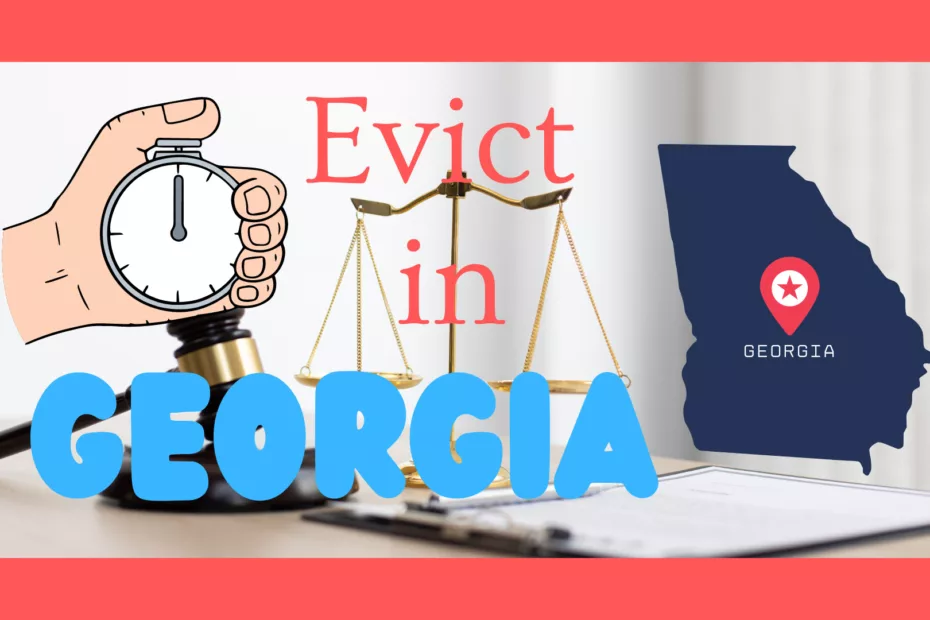Evicting a tenant is never a pleasant experience, and it’s best if you can remedy the problem by other means. The eviction process varies significantly by state and can even differ by county. I have been a landlord in Georiga for over 15 years and have been involved with numerous evictions. I can teach you the process in Georgia and estimate how long it takes to evict someone in Georgia.
In Georgia, the entire eviction process takes about 28 days. The number of days may differ based on the situation and the speed with which an individual county operates.
In this article, I’ll explain the eviction process in Georgia, explain how long each step typically takes, and give you tips for a smooth eviction. Please note that the process to evict in Georgia is governed by Georgia law and is not to be considered legal advice.
Grounds for Eviction in Georgia

The landlord can evict a tenant in Georgia for any legal lease agreement violation. The most common reason for eviction is nonpayment of rent, but the tenant can be evicted for other reasons.
Reasons a tenant may be evicted:
- Failure to Pay Rent
- Holdover Tenant – Failure to Move at Lease Expiration
- Excessive Damage to the Property
- Smoking, when the lease states smoking is not allowed
- Having more than the agreed-upon number of pets
- Engaging in Crimal Activity
If the landlord is evicting for nonpayment, the tenant has seven days to pay the rent owed and stop the eviction. This means paying the rent within seven days is a valid defense, and the eviction will be stopped. However, the landlord is only required to accept this late payment once in a 12-month period.
Georgia Eviction Process

In Georgia, self-help evictions are illegal. A landlord can not kick out a tenant without going through the formal eviction process. During the dispossessory proceedings, the tenant can stay in the house, and the landlord must still perform rental property maintenance.
1. Give Notice
The first step to evict in Georgia is to give the tenant notice. This notice is not required to be in writing, but a landlord may have trouble providing notice when it’s verbally given. It’s always best to notify the tenant with a written notice to avoid problems.
Proper notice should include a demand for possession; the property owner must demand the tenant give up possession of the premises and leave within a certain number of days. In Georgia, this notice can be given immediately after a lease violation has occurred, and there is no set number of days the tenant must be given to leave.
In cases when there is no lease, the landlord must give the tenant 60 days’ notice before forcing a tenant to leave. As a landlord, always insist on a lease. In a special situation where the tenant will be short-term, the property owner can provide a generous exit clause.
I send a written eviction notice for past due rent as soon as the rent is late. If rent is due on the first and is not received, I send the tenant notice the next day. I demand possession within five days. It’s better to get the processes started early. If the tenant pays the rent, you take it no further, but you are ready to begin the dispossessory action if they don’t pay.
My demand letter includes the statement below.
You [tenant name] are notified that you have violated or failed to perform the terms of the Lease as follows:
[list lease violations]
You must surrender possession and vacate the premises within 5 days after service of this notice.
This statement is almost precisely what is suggested in the official Georgia Landlord Tenant Handbook.
2. File
The next step in the eviction process is filing for the actual eviction. After the time stated in the written eviction notice, the landlord can file a dispossessory action under oath in the magistrate court in the county where the rental unit is located. This filing should include the reason the tenant is being evicted and state any amount owed.
In the state of Georgia, the landlord cannot accept rent after filing the eviction lawsuit, as this would give the tenant a defense. However, if the eviction takes more than two weeks, the landlord can request that the court order the tenant to make the rent payment to the court.
3. Tenant Service
After the landlord files for eviction, the dispossessory affidavit must be legally delivered to the tenant. In most Georgia counties, the sheriff will serve the tenant.
The three ways an eviction notice is delivered to tenants in Georgia:
- Personal Service
- Delivered to an adult that lives in the rental unit.
- Tack and mail.
Tack and mail means to tack the notice to the home’s door and mail the notice on the same day. If tack and mail was used, and the tenant does not file an answer, the court cannot award a monetary judgment, but they can grant possession. If the landlord intends to ask for unpaid rent, they should request a personal service notification.
4. The Answer
After the tenant receives the summons, they have seven (7) days to respond, either verbally or in writing. The answer is the tenant’s chance to explain why the landlord is not entitled to evict. In most cases, the landlord will receive a default judgment if the tenant does not respond by the 7th day. A default judgment is granted in favor of the landlord when the tenant does not respond to a court order or fails to appear in court.
If the tenant has a counterclaim against the landlord, they must include this with the answer. A counterclaim is any claim that the landlord is not fulfilling their duties as a landlord, such as failing to make repairs. If the tenant fails to mention a counterclaim, they may be denied the opportunity to bring it up in court.
When an answer is filed, a court date will be assigned. The court clerk must treat any answer as valid and legal. If the answer is invalid, the judge must make this ruling at the eviction hearing or an earlier hearing.
5. Eviction Hearing
A hearing on the issues will be held if the tenant has filed a valid answer. At the hearing, both sides will have a chance to present their eviction case to the judge. The judge will then decide whether or not to evict the tenant.
As a landlord, the hearing is the place to present all the evidence that the tenant has violated the lease. Bring the payment ledger, pictures of damages, and any supporting evidence. If the landlord cannot convince the judge of the lease violations to try again, they must restart the process from the beginning.
6. Writ of Possession
At the hearing, if the landlord wins, the judge will order the tenant to leave in a certain number of days, usually seven days. If the tenant does not leave, the landlord can force removal by filing a writ of possession.
The writ of possession is a court order that gives a landlord the right to take possession of a property. It’s the final notice instructing the tenant to leave the rental unit, allowing them to remove their personal belongings. This writ of possession gives the landlord the right to remove the tenant and their belongings from the property.
An office of the court, usually from the sheriff’s department, will serve the tenant with the writ of possession. This is the final notice the tenant receives.
7. Removal
If the tenant is still in the rental property after the writ of possession is served, the tenant will be forced to leave the property. The put-out will occur sometime after the tenant is served (about 3-5 days).
The sheriff arrives to supervise the removal of the tenant’s belongings. The landlord is responsible for the cost of removing the items and should provide the necessary workers to have all belongings removed in a safe and orderly fashion.
The tenant’s property should be removed from the house and placed on some of the landlord’s property. If the landlord and officer agree, the property can be placed on the sidewalk or street. The landlord must make reasonable efforts to avoid damage when removing the property, but they are not responsible for it after removal.
Generally, once the landlord takes possession of the property, the lease is terminated, and the tenant does not owe future rent.
8. Appeal
The landlord and the tenant have seven days from the date the judgment was entered to appeal. An appeal stops the writ of possession from being executed. The tenant can stay in the unit during the appeal but must pay rent to the court.
Conclusion
A landlord in Georgia can evict a tenant for any violation of the lease agreement, but the most common reason is nonpayment of rent. Other grounds for eviction include failure to move at the end of the lease, excessive damage to the property, smoking in a non-smoking unit, having more pets than allowed and engaging in criminal activity.
In Georgia, it takes about 28 days to evict someone. The landlord must notify the tenant, but they can file the eviction immediately. Once served, the tenant must respond within seven days. A court hearing is scheduled, and both sides present their case. If the landlord wins and the tenant does not leave, the sheriff’s office will force them from the property.
For more information, I have written a guide on the cost of evicting a tenant. Give it a read before filing an eviction.




